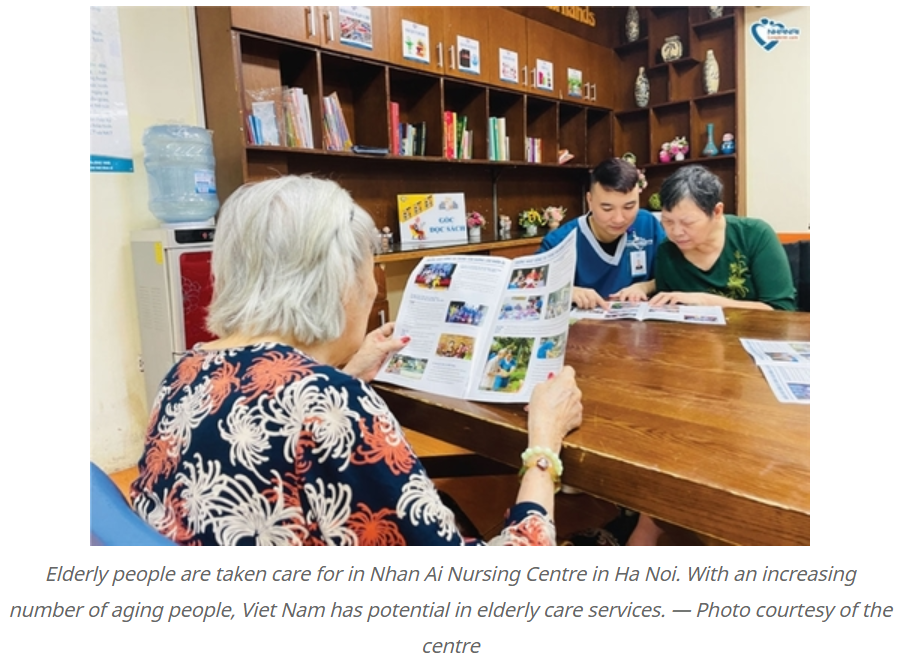Vietnam: Market potential of elderly service industry growing fast
The increasing demand for services for the elderly has created investment and business opportunities for local and foreign investors.
The Viet Nam Chamber of Commerce and Industry (VCCI) in HCM City and the United Nations Population Fund (UNFPA) launched the Network for the Development of Business Services for Older Persons in Viet Nam.
According to the VCCI’s Elderly Care Service Market Outlook Report in Viet Nam, the country has a promising market for elderly care services, with 20 million potential customers by 2035.
The network was designed as a special forum to connect business stakeholders, explore cooperation and seek opportunities in the development of business services for the growing elderly population in the country.
VCCI Vice President and VCCI HCM City head Vo Tan Thanh said: “The increasing demand and more diversified needs of older persons present numerous opportunities for domestic and foreign businesses and investors in Viet Nam.”
“Fully recognising the importance and necessity of formulating a network of stakeholders to promote the development of this potential service industry, VCCI, as a representative organisation of the business community to perform the functions of trade and investment promotion in Viet Nam, will strongly and effectively support the network’s operation going forward.”
Naomi Kitahara, the UNFPA Representative in Viet Nam shared the same view: “The network is designed to contribute to developing a diverse senior care service industry in terms of types, sizes and fields of operation, meeting the growing needs of older persons, promoting business links and attracting domestic and foreign investors.”
“The network also supports the development of human resources with qualifications and skills to work in the senior care service industry. UNFPA is delighted to contribute to the establishment of the network.”
VCCI’s report estimated that the elderly care market in Viet Nam will have an annual growth rate of up to 7 per cent from 2020 to 2027. In the Asia Pacific region, the rate was expected to be up between 7.7 and 14.6 per cent from 2018 to 2022, with a total value of up to US$2 trillion, making it a potential market of great value, the report said.
Bui Anh Trung, director of Binh My Nursing Home, said: “There are many opportunities for businesses to participate in the elderly care service field.”
Trung said after the pandemic, all family problems and health perceptions had been changed, especially for the elderly care as children wanted a place to take care of the elderly to ensure safefty, especially in a pandemic.
Trung also said the aging population was increasing in Viet Nam while the market for nursing homes was currently very small, adding: “Investment opportunities in the construction of nursing homes is of great potential.”
Earlier, Matthew Powell, director of Savills Ha Noi, told local media: “The senior living and medically-assisted living healthcare sector is well-established in many countries globally, where there is a growing elderly population. This sector has evolved to provide a professional and pleasant environment for those that need care, a relief to family caregivers who often do not have a specialised understanding of elderly care or the facilities.”
“It has also led to the emergence of an interesting liquid real estate investment opportunity akin to specialised ‘branded residences’ with rental pools or serviced apartments appealing to large investors, developers and individuals.”
Promoting business links and Investment attraction
Considering the financial dependence of the elderly on their children and relatives as a challenge of the market, members of the network said service providers must develop services convincing enough to both the elderly and their descendants, who pay for the services.
For example, a private room in Nhan Ai Nursing Centre or Tuyet Thai Centre in Ha Noi cost more than VND15 million ($750) each, while higher fee will be asked for a room in Thien Duc Nursing Home or Lotus Nursing Center in HCM City.
The network would create an in-depth forum for partners to exchange, connect and seek co-operation opportunities to promote the development of the elderly care service, as well as improvement the service industry ecosystem for the elderly in Viet Nam.
The network has been developed with technical support from UNFPA and financial support from the Government of Japan through the Project “Mitigating the negative impacts of COVID-19 on vulnerable population groups – Ensuring National Progress to Achieve SDGs in Viet Nam.” — VNS
Viet Nam’s population aging is progressing fast due to mortality and fertility declines. In 2020, older people aged 65 and above accounted for 8 per cent of the population, and it is estimated that by 2036, Vietnam will transit from an “aging” to an “aged” country where those aged 65 and above will be 14 per cent of the total population.
The Ministry of Labour, Invalids and Social Affairs estimates that the number of older persons who require daily care will increase from 4 million in 2019 to around 10 million by 2030.
According to a report by Savills Viet Nam, by 2050, Viet Nam will have a super-aged population, in which over 20 per cent of the population will be over 65, adding that in 2019, people over 60 accounted for 11 per cent of Viet Nam’s population, increasing from 8.6 per cent in 2009.
The report said the residential facilities with care services, for older people were mostly untouched in Viet Nam though there were increasing numbers of private offerings.
Out of the country’s 63 provinces, only 32 have specialised facilities for the elderly. The government aims to have at least one facility in each province by 2025.
Source: VNS


 English
English




